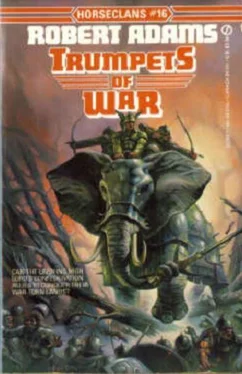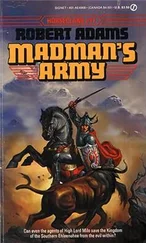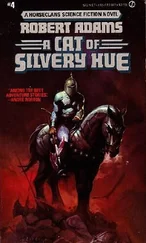Then he waved Gil to a padded chair. “Sit you down, Captain. Our Hohfos will be back shortly with cheeses and other oddments. Not only am I ever glad to meet another admirer of elephants, your visit today gave me a rare chance to get away from the boring details of Council. I tell you, Captain, had I not pledged to stay here until planting time ...” The big man sighed gustily and shook his close-cropped head.
“But tell me, Captain, how do you people stay warm in winter in simple hide tents?”
“We don’t, Lord Thoheeks” Gil replied. “We don’t live in tents at all, except on hunting trips. Our homes are yurts, made of wood and hides and canvas and many layers of felt. So warm are they that even in the most bitter weather, a mere lamp will often render them so hot that vents must be opened to maintain comfort. Such winter warmth is unknown to you Ehleenoee, Lord Thoheeks . . . but then of course we barbarians have never attained to full many of the wonders of your sophisticated civilization.”
The thoheeks stared hard at Oil for a long moment, then his lips began to twitch, then they bent upward into a grin, and when the man knocked, then entered with a tray of foods, followed by another man bearing two long, thick robes, Sitheeros was laughing uproariously, his face red and tears squeezing from out his eyes.
With visible effort, he sobered in the presence of the servants, though the stray chuckle still escaped him now and then, while the smaller trays were laid out on the table, brandy and smaller goblets fetched from a cabinet, the two of them helped into the warm robes and their chairs moved to opposite sides of the table.
To the departing servants, he said, “Tell the guards that if the city should suddenly be attacked, they may disturb me; otherwise, I am not available to anyone for any reason.
“May I call you Gil? ‘Captain’ is so formal, and I truly like you.” At Gil’s nod, he went on. “Good, then call me Sitheeros, Gil . . . when we two are alone, of course; one must keep up appearances, otherwise. Yes, rank indeed hath its privileges, but its full weight of firm responsibilities far outweighs its few middling privileges, I’ve always felt.
“Although you gave me the first good laugh I’ve had since I came to Mehseepolis by your manner of cool, politely phrased insult, you were completely right, completely justified in saying just what you did say. We Ehleenoee have always boasted and bragged to everyone who would or could be compelled to listen of our civilized and progressive culture. At one time, there was assuredly a reason for such boasting, but most Ehleenoee of the recent past and of today have scant reason to boast of anything, although it pains me to say it, it’s true.
“We’re most of us a static culture, really less civilized in certain important ways than many of those peoples we slander with the name ‘barbarian.’ For too long, we have been of the firm mindset that our way must be better because it was the way of our ancestors who conquered these lands hundreds of years ago, and so we have been too proud to try to learn ways that might be new and better and easier and more efficient that the old ones.
“Take this ducal palace, for an example, Gil. This is your classic Ehleenoee palace, and a blind man could see that it was never designed for comfortable, year-round housing in a climate like this one. No one now alive knows whenever and wherever this design originated, but 1 will guarantee that it was not here, not in the onetime Kingdom of the Southern Ehleenoee, but in a clime that was far warmer.”
The thoheeks pointed a finger up at the plaster mouldings that decorated the ceiling and held the chains of the brazen lamps.
“Gil, there is no room in the living section of this palace that is lower than three full mehtrahee, and some are far higher, and this is fine and cool and breezy in hot weather, but in winter, there is no earthly way to adequately heat such rooms, especially when those rooms have cold stone walls and floors. Believe me or not, the rooms in the citadel yonder are far more comfortable in cold weather than are any in this palace. And the reason why is simple—they have lower ceilings, hardwood floors mostly, few and narrow windows, they’re generally smaller, and many contain hearths built into the walls which will burn logs as well as coal or charcoal—and I am moving into a suite over there immediately it is prepared and furnished to my taste.”
“Is that what you did back at Iron Mountain, Sitheeros?” asked Gil. “Did you move into your citadel of winters?”
The burly man shrugged. “I don’t know how they made out there back in the bad old days, just suffered through it, I’d guess, like the folk here do. But we of Iron Mountain have always been somewhat different from your average lowlander Ehleenoee, Gil. We’ve always been willing to try new things and see if they might work better than our traditional things and ways.
“When, during the Great Disaster of three hundred-odd years ago, our palace first shook down, then burned, my many-times-great-grandsire—for, you see, unlike the case with most of the lowlander Ehleenoee, the title and lands have never left my family since first we wrested Iron Mountain and the other lands from the folk who then held it—sought out certain ancient ruins he had recalled seeing in travels and on hunts, studied the principles of the smokehouses and the barns wherein tobacco is cured, then drew up plans and saw to it that his new palace was built just as he had envisioned it.
“Since then, Gil, the entire central wing of our palace has been heated by fires burned in huge iron kahmeenohsee in the cellars.”
Gil wrinkled his forehead and asked, “Your pardon, Sitheeros, but that is one Ehleen word I’ve never heard before. What is a kahmeenos?”
The thoheeks smiled good-naturedly. “Of course you haven’t heard the word; I don’t know of any other Ehleenoee who use anything like it. Look you: imagine if you will a mighty iron caldron, far higher than a man big enough around to fit six or eight standing men into; imagine a thick iron grill fitted into it as a platform on which to burn fuel—mostly earth-coals, of which our mines produce a plentitude—with an iron door just above it to feed in fresh fuel, then imagine an iron sheet some foot or so beneath to catch the ashes and cinders and another iron door at that level to allow them to be pulled or shoveled out. That is akahmeenos, Gil.”
Gil shook his head. “But I still don’t understand how this device can heat an entire palace.”
“That was the true genius of my ancestor, coupled of course with his willingness to try new things, think ideas no Ehleenoee had been willing to think before him,” replied the thoheeks. “Look you, Gil, when a fire is burning, the smoke usually rises. Do you know why?”
Gil looked puzzled. “Hmmm, I never really thought on it, it was just something that happened because it had always happened. Why?”
The thoheeks grinned maliciously. “Keep up that line of thinking, Gil, apply it to everything, and before long you will be the true equal of any sophisticated, civilized Ehleen. Heat alwaysrises, Gil, and smoke rises because of the heat it contains. My ancestor had hollow spaces built beneath the floors and inside the interior walls of the new palace he built. Inside those spaces he had installed wide tubes of thin copper and iron and brick clays all leading up from one or the other of the kahmeenohsee. The heat rises up from them into the tubings, you see, and the heat radiates upward and outward from them to heat the rooms and chambers, even the corridors. In the worst of the cold times, the stables of both horses and elephants are heated by more recently built kahmeenohsee, as too are the barracks of the Iron Mountain Guards.”
Читать дальше












